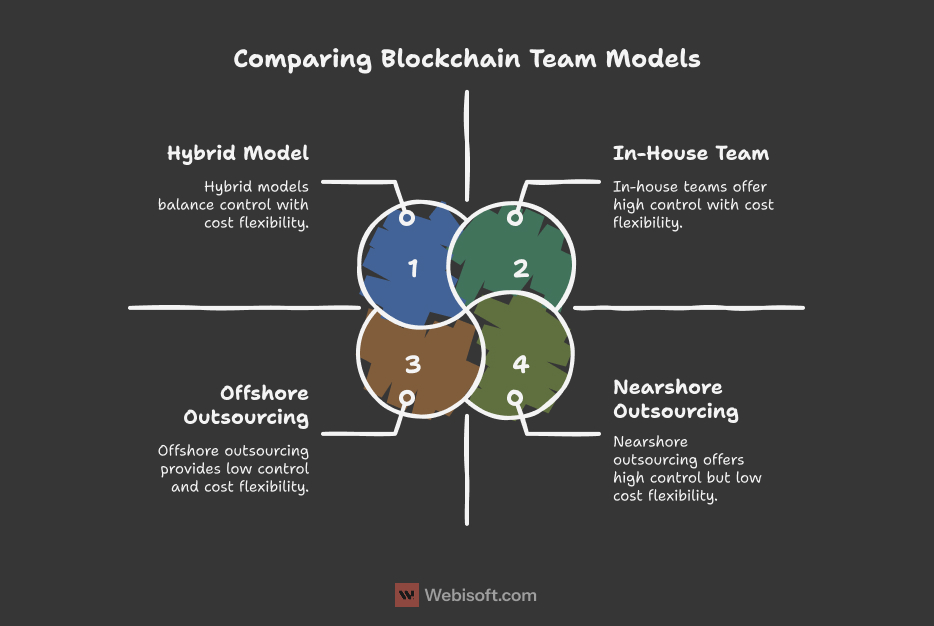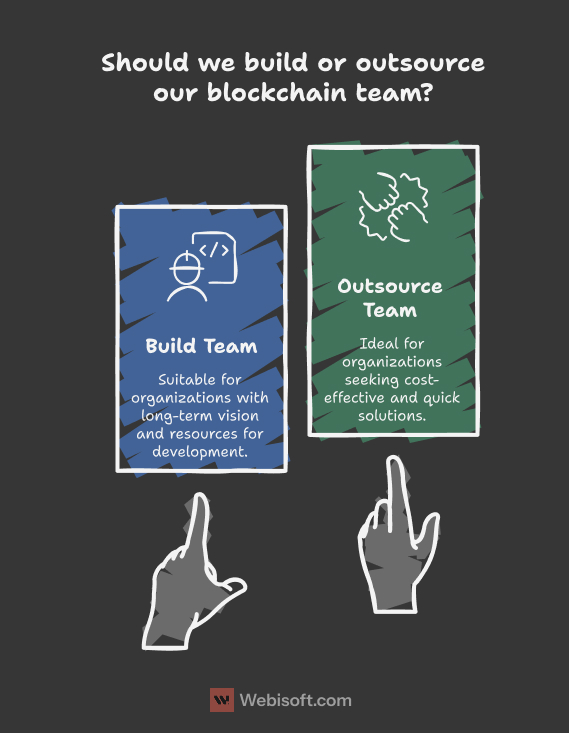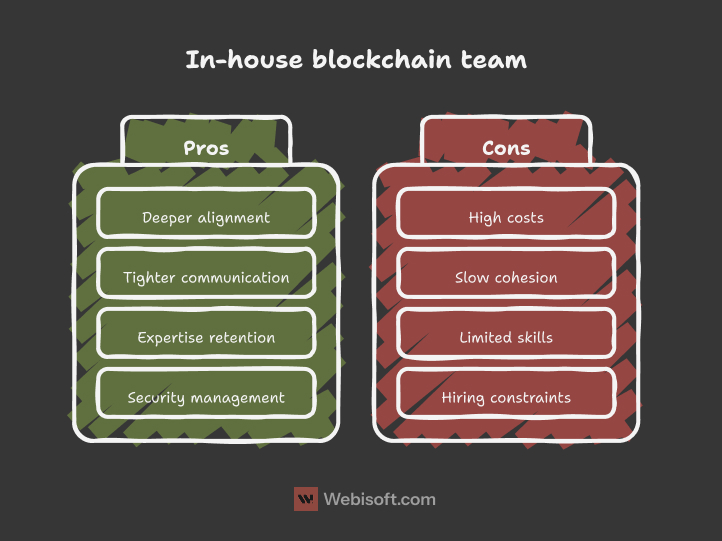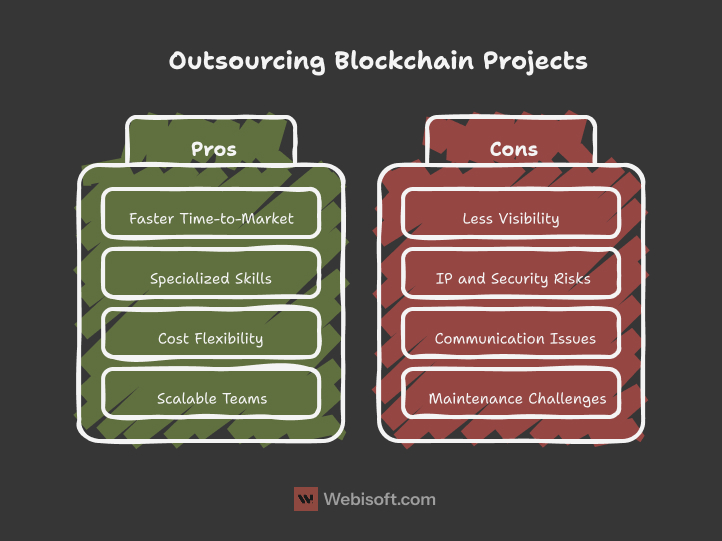In-House vs Outsourced Blockchain Teams: Pros and Cons
- BLOG
- Blockchain
- October 11, 2025
Choosing the right blockchain development team model is one of the most important early decisions for any Web3 founder, CTO, or product lead. Should you build an in-house team of full-time developers or partner with an outsourced blockchain agency? Each approach offers distinct benefits and trade-offs, from cost and speed to control, security, and long-term scalability. This guide will walk you through the core differences, practical pros and cons, and strategic considerations that matter in 2025. Whether you’re launching an MVP, scaling a protocol, or adding tokenization to an existing app, this article will help you confidently decide:
- When to hire in-house
- When to outsource
- When a hybrid model makes the most sense
Let’s explore what works best for your project.
Contents
- 1 What’s the Difference Between In-House and Outsourced Blockchain Teams?
- 2 Why Do Startups and Enterprises Choose One Over the Other?
- 3 What Are the Pros and Cons of Hiring an In-House Blockchain Team?
- 4 What Are the Pros and Cons of Outsourcing Blockchain Development?
- 5 What Questions Should You Ask Before Hiring In-House or Outsourced Blockchain Development Teams?
- 6 Can You Combine In-House and Outsourced Blockchain Teams?
- 7 What Are Common Pitfalls to Avoid When Choosing Blockchain Talent Models?
- 8 FAQs: In-House vs Outsourced Blockchain Teams
- 8.1 What is more cost-effective for a blockchain startup — outsourcing or hiring in-house?
- 8.2 How do I know if I need a blockchain dev agency or a full-time team?
- 8.3 Is outsourcing secure for confidential blockchain project IP?
- 8.4 Can outsourced teams help me pass smart contract audits?
- 8.5 What if my outsourced team disbands after project delivery?
- 9 Conclusion: Which Team Model Is Right for Your Blockchain Project?
What’s the Difference Between In-House and Outsourced Blockchain Teams?
When you’re planning a blockchain project, one of the first strategic decisions you’ll face is how to build your development team. Should you hire full-time blockchain engineers to work in-house, or partner with an external team that specializes in smart contracts and decentralized apps?
Think of it like building a house. Hiring an in-house team is like employing a crew that works exclusively for you, familiar with your blueprints, company culture, and long-term vision. Outsourcing, on the other hand, is like bringing in a specialized contractor: they deliver the build quickly, often with expertise you don’t have in-house, and move on once the job is done.
To make an informed choice, it’s important to clearly define both models and what they mean in a Web3 development context.
What Is an In-House Blockchain Development Team?
An in-house blockchain team consists of full-time employees hired directly by your company. These team members are on your payroll and typically contribute to long-term development, product ownership, and R&D. They’re ideal for startups building proprietary platforms, Layer 1 or Layer 2 protocols, or blockchain infrastructure meant to evolve over time.
The advantages? Higher alignment with your company’s goals, more control over development cycles, and better institutional knowledge retention.
What Does It Mean to Outsource Blockchain Development?
Outsourcing blockchain development means partnering with external service providers; this could be a dev shop, a blockchain consulting agency, or freelance experts. Outsourcing models can vary:
- Nearshore outsourcing: Working with teams in nearby time zones.
- Offshore outsourcing: Engaging developers from lower-cost regions globally.
- Hybrid models: A blend of local management with external execution partners.
Outsourcing is especially attractive for MVP development, audits, token launches, or when you need fast access to specialized skills without long-term commitments.

Why Do Startups and Enterprises Choose One Over the Other?
Not every blockchain project has the same needs. Whether you’re building an MVP, launching a Layer 2 protocol, or integrating smart contracts into an existing product, your team model should reflect your priorities – speed, control, expertise, or scalability.
What I’ve seen across various blockchain projects is that the decision between hiring in-house vs. outsourcing often comes down to business maturity, budget flexibility, and how central blockchain is to your core product.
When Do Startups Prefer to Outsource Blockchain Development?
Startups and early-stage Web3 ventures are often racing to prove product-market fit. They need to move fast, validate ideas, and keep burn rates low. That’s where outsourcing shines. Here’s why I’ve seen startups choose this path:
- Speed to execution: No long recruitment cycles or onboarding.
- Specialized skills on demand: You can plug into developers with tokenomics, NFT, or zk-rollup experience without hiring them full-time.
- Flexible budgeting: Pay per sprint, per milestone, or based on deliverables.
- Minimal overhead: No HR, benefits, or retention concerns.
This model works especially well for MVPs, token launches, and protocol forks where speed and experimentation matter more than long-term in-house cohesion.
When Do Enterprises Build In-House Blockchain Teams?
On the other hand, enterprises and funded startups with a long-term product roadmap often choose to build internal blockchain teams. Here’s why:
- IP control: Blockchain is often core to their competitive moat. They want full control over smart contracts, data, and architecture.
- Long-term maintenance: As blockchain products evolve, so does the codebase. An internal team offers continuity and faster response to issues.
- Cross-functional collaboration: In-house teams can integrate more easily with product, compliance, and infrastructure units.
- Regulatory alignment: Enterprises often need tight security and legal oversight, which is easier with in-house staff.

What Are the Pros and Cons of Hiring an In-House Blockchain Team?
Hiring an in-house blockchain development team is a major commitment. It works well when blockchain is core to your product, and you’re building for the long term. But it also comes with overhead, management complexity, and time-to-scale concerns. Based on what I’ve seen with Web3 startups and enterprise teams alike, here’s a balanced look at the advantages and trade-offs of going in-house.
What Are the Key Advantages of In-House Blockchain Teams?
- Deeper Product Alignment
Internal teams are more invested in your mission. They work side by side with your product leads, understand user feedback firsthand, and evolve with your roadmap. - Tighter Communication
Day-to-day interaction is easier when everyone’s under the same umbrella. No delays across time zones or lost context between sprints. - Long-Term Retention of Domain Expertise
Your team develops an in-depth understanding of your architecture, tokenomics, compliance needs, and technical debt – all of which are critical for sustained product growth. - Easier to Manage Security and IP Internally
Sensitive codebases, audit requirements, and smart contract keys can be managed with stricter access control when everything stays in-house.
In Web3, where bugs can be exploited in seconds and token values depend on trust, having a team that knows your system intimately can be a major advantage.
What Are the Downsides of Hiring In-House Developers?
- High Recruitment and Training Costs
Blockchain developers are in demand. Hiring just one experienced smart contract engineer can cost over $150K/year, not counting benefits, bonuses, and recruiter fees. - Longer Time to Build Team Cohesion
Assembling a full team from scratch takes time, even longer if you need niche expertise like Layer 2 integrations or DeFi protocol security. - Limited Skill Diversity Unless the Team Is Large
With a small team, it’s hard to cover every area (e.g., backend, frontend, tokenomics, security audits). That may force generalists to stretch across roles, affecting quality. - Geographic and Salary Constraints
You’re often limited by your hiring market. If you’re based in a region with few blockchain devs, you’ll face tough competition or need to support remote work with the right structure.

What Are the Pros and Cons of Outsourcing Blockchain Development?
Outsourcing blockchain development can be an effective way to move fast, access top-tier talent, and reduce costs, but it’s not without its trade-offs. Based on what I’ve seen working with startups and scale-ups, the key to successful outsourcing lies in choosing the right partners and knowing where outsourcing fits in your roadmap.
What Are the Advantages of Working with Outsourced Blockchain Teams?
- Faster Time-to-Market
When speed matters, outsourcing helps you skip the hiring process and start building right away. A good dev firm can spin up a team in days, not months. - Access to Specialized Skills
Need someone with experience in ZK-rollups, tokenomics modeling, DeFi protocols, or Layer 2 scaling? The right agency already has these specialists in-house or on-call, no need to train from scratch. - Cost Flexibility Through Contracts
Outsourcing lets you pay for outcomes, not overhead. You can structure billing per sprint, per milestone, or per full project, depending on your needs and cash flow. - Scalable Teams With Cross-Project Experience
Many blockchain dev firms work across multiple ecosystems, like Ethereum, Solana, Avalanche, etc. That cross-pollination of experience means they bring proven patterns and insights from past work to your project.
I’ve seen this model work well for MVPs, short-term token launches, and experimentation phases where speed and flexibility are more valuable than deep product immersion.
What Are the Disadvantages of Outsourcing Blockchain Projects?
- Less Visibility and Transparency
You’re one step removed from the developers writing your smart contracts or shipping your dApp. Unless communication is crystal clear, misalignment can creep in fast. - IP and Security Concerns
Not all vendors have rigorous processes for managing keys, securing codebases, or protecting sensitive business logic. Poorly scoped contracts can leave your IP exposed. - Time Zone and Communication Issues
Even great teams can hit roadblocks if you’re not aligned on working hours, standups, and delivery cadence. I’ve seen promising builds slow down just because of timezone gaps. - Harder to Maintain Code Without a Retainer
Once delivery ends, support often stops. If your outsourced partner disappears or pivots, your internal team may struggle to maintain or expand the codebase.

What Questions Should You Ask Before Hiring In-House or Outsourced Blockchain Development Teams?
Choosing between an in-house or outsourced blockchain team isn’t just a hiring decision, it’s a strategic one. I’ve seen projects succeed or stall depending on how clearly the founding team assessed their actual needs upfront. These questions help clarify what path makes the most sense for your build, budget, and business model.
What’s the Scope and Complexity of Your Project?
Not all blockchain projects require the same depth of technical architecture. Here’s how I typically break it down:
- DeFi protocols or Layer 1 integrations usually require deep, ongoing expertise. In-house or hybrid teams are often a better fit.
- NFT marketplaces or tokenized MVPs can be shipped quickly by outsourced partners with templated workflows.
- Enterprise PoCs may need rapid prototyping, making nearshore outsourcing ideal for early testing.
The more complexity and long-term architecture your project involves, the more benefit you’ll get from having team members who live and breathe your roadmap.
Do you know? The Blockchain Market Is Set to Reach Nearly $2 Trillion by 2034
Do You Have the Budget to Support a Full-Time Team?
Hiring full-time blockchain developers isn’t cheap. Salaries for smart contract engineers and Web3 backend developers can range from $100,000 to $180,000+ annually, not including equity or bonuses. Add recruitment, onboarding, and benefits; and it’s easy to burn through your runway fast.
If your budget can’t support 6–12 months of in-house payroll, consider outsourcing the build and bringing people in-house later for maintenance and iteration.
Is Blockchain Your Core Product or a Supporting Feature?
This one is easy to overlook. If blockchain is fundamental to your product; say, you’re building a DeFi protocol or DAO infrastructure – having long-term control over the code and team is crucial. That typically points to hiring in-house.
But if you’re simply integrating NFTs into a loyalty app or tokenizing a single part of your supply chain, outsourcing might be more efficient and less risky.
You might also like: How Real Estate Tokenization Works: Complete Guide
Do You Need to Build Fast or Build Deep?
Speed and control don’t always come together. If you need to launch quickly, for example, to capitalize on a market trend or investor deadline; outsourcing often gives you that velocity. But if your goal is tight control over architecture, long-term maintainability, and custom infrastructure, an in-house team gives you more leverage.
Can You Combine In-House and Outsourced Blockchain Teams?
In practice, the choice between in-house and outsourced blockchain development isn’t always black and white. Many of the most successful Web3 projects I’ve seen, especially those scaling from MVP to full product, use a hybrid team model. This lets them move fast where needed, while maintaining strategic control over the most critical parts of their stack.
How Do Hybrid Blockchain Teams Work in Practice?
In a hybrid model, core responsibilities stay in-house while specialized or high-velocity tasks are handled by an external team. Here are common hybrid structures I’ve helped set up:
- Product & strategy in-house — while the execution (smart contracts, audits, frontend dApp builds) is done by a vetted dev shop.
- Security-sensitive components (like wallets, custodial logic) managed internally, but marketing sites, dashboard UIs, or token sale pages are outsourced.
- In-house CTO with architecture ownership — working with external developers on delivery sprints or testing cycles.
This division of labor lets you retain control where it counts and scale engineering output when needed.
What Are the Benefits of a Hybrid Blockchain Team Strategy?
The hybrid model often offers the best of both worlds:
- Strategic control over roadmap, governance, and security-sensitive modules
- Faster scaling during high-demand phases like token launches or audits
- Access to specialized talent (like zero-knowledge, oracles, or Layer 2 integration) without long-term hiring costs
- Budget flexibility, especially when burn rate is a concern
I’ve seen this model work especially well for startups that are moving from seed to Series A, where leadership needs to lock down IP and product fit, but still deliver quickly with lean internal teams.
If structured right, hybrid teams can accelerate delivery while keeping your internal team focused on what only they can do.
What Are Common Pitfalls to Avoid When Choosing Blockchain Talent Models?
Whether you’re hiring in-house or outsourcing blockchain development, the stakes are high. I’ve seen teams lose precious runway or stall critical launches not because of bad intentions, but because of avoidable hiring missteps. Knowing what can go wrong early helps you build smarter.
What Mistakes Happen When Rushing to Outsource?
When outsourcing is done right, it speeds you up. But when it’s rushed, it can lead to setbacks and budget waste. Here are the most common mistakes I’ve seen:
- Skipping due diligence: Many founders hire firms based on referrals or sales calls alone. Always review code samples, verify past work on-chain, and speak with previous clients.
- Unclear specs and deliverables: If you hand over vague ideas instead of clear documentation, you’ll get mismatched results. Even agile shops need defined sprints and responsibilities.
- Choosing based on price alone: It’s tempting to go for the lowest quote, but in blockchain, cheap often means inexperienced. I’ve seen projects rewritten entirely due to poor initial code.
What Mistakes Happen in In-House Team Formation?
Building in-house gives you long-term stability, but only if you scale it thoughtfully. Here’s what can go wrong:
- Hiring too many too soon: Early-stage teams sometimes build a full Web3 team before they’ve validated the core product. This bloats burn and slows down iteration.
- Team burnout: Lean teams juggling smart contracts, integrations, testing, and support quickly hit a wall. I’ve seen great developers leave because expectations weren’t realistic.
- Hiring generalists when specialists are needed: Blockchain development is nuanced. If you’re building with Solidity, ZK-proofs, or Cosmos SDK, hire accordingly or bring in outside support.
The goal isn’t to avoid every mistake, but to plan with eyes open. Build your team model around your product’s real needs; not assumptions.
FAQs: In-House vs Outsourced Blockchain Teams
Choosing between in-house and outsourced blockchain development isn’t always clear-cut. These are some of the most common questions I get from founders and CTOs trying to navigate this decision.
What is more cost-effective for a blockchain startup — outsourcing or hiring in-house?
Outsourcing is often more affordable upfront. You can hire a firm for a fixed-scope project or sprint-based engagement without committing to full-time salaries, benefits, or infrastructure. This makes it ideal for MVPs or time-sensitive launches. In contrast, building an in-house team involves recruiting, onboarding, and long-term payroll, but offers more strategic value if blockchain is core to your business. The real cost-effectiveness comes from choosing based on your stage and goals, not just the hourly rate.
How do I know if I need a blockchain dev agency or a full-time team?
Start by asking: is blockchain your core product or just a feature? If it’s central to your offering (like a DeFi protocol, DAO tooling, or NFT infrastructure), you’ll eventually want in-house ownership. If it’s one part of a broader platform, like wallet integration or token gating, a dev agency might be the faster, lighter fit. Also consider your team’s technical depth. If you lack blockchain-specific skills internally, starting with an agency can bridge the gap.
Is outsourcing secure for confidential blockchain project IP?
It can be, but only with the right precautions. Choose vendors with clear IP terms, strong legal contracts, and a transparent security posture. Use NDAs and define ownership of deliverables in writing. I’ve seen well-managed outsourced teams handle sensitive smart contracts and tokenomics, but the risk rises with unknown or opaque vendors. Always do your diligence.
Can outsourced teams help me pass smart contract audits?
Yes, many dev firms specialize in writing audit-ready code and even work closely with audit partners. Ask if they follow secure development practices, use test coverage tools, and can produce documentation for auditors. However, audits are still your responsibility, even if the code came from a third party.
What if my outsourced team disbands after project delivery?
This is a common fear, and it’s valid. To prepare, ensure all code is well-documented and repositories are shared with your team. Consider negotiating a post-delivery maintenance agreement or having at least one in-house developer familiar with the codebase. The best firms will help you transition ownership smoothly but you have to plan for it.
Conclusion: Which Team Model Is Right for Your Blockchain Project?
There’s no universal answer to whether an in-house or outsourced blockchain team is better and that’s the point. The right choice depends on your product’s maturity, available capital, internal expertise, and how central blockchain is to your value proposition.
If you’re a startup racing to test an idea, outsourcing can give you speed, flexibility, and deep technical firepower without the long-term commitment. But if your product’s roadmap depends on blockchain innovation over time, an in-house team helps you retain IP, build institutional knowledge, and create a tightly aligned dev culture.
Here’s a quick way to frame the decision:
- Choose outsourcing when you need speed, specialists, or a temporary skill boost.
- Choose in-house when you need control, continuity, and deep alignment with your business model.
- Consider a hybrid model if you want both, fast delivery and long-term strategy.
No matter which path you choose, make the decision intentionally. The right team model can accelerate your Web3 journey. The wrong one can slow it down before it even starts.
